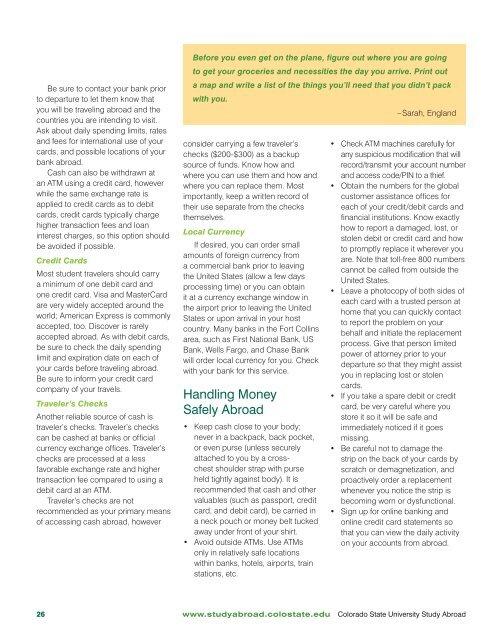CSU Pre-departure guide - Study Abroad - Colorado State University
CSU Pre-departure guide - Study Abroad - Colorado State University
CSU Pre-departure guide - Study Abroad - Colorado State University
Create successful ePaper yourself
Turn your PDF publications into a flip-book with our unique Google optimized e-Paper software.
Be sure to contact your bank prior<br />
to <strong>departure</strong> to let them know that<br />
you will be traveling abroad and the<br />
countries you are intending to visit.<br />
Ask about daily spending limits, rates<br />
and fees for international use of your<br />
cards, and possible locations of your<br />
bank abroad.<br />
Cash can also be withdrawn at<br />
an ATM using a credit card, however<br />
while the same exchange rate is<br />
applied to credit cards as to debit<br />
cards, credit cards typically charge<br />
higher transaction fees and loan<br />
interest charges, so this option should<br />
be avoided if possible.<br />
Credit Cards<br />
Most student travelers should carry<br />
a minimum of one debit card and<br />
one credit card. Visa and MasterCard<br />
are very widely accepted around the<br />
world; American Express is commonly<br />
accepted, too. Discover is rarely<br />
accepted abroad. As with debit cards,<br />
be sure to check the daily spending<br />
limit and expiration date on each of<br />
your cards before traveling abroad.<br />
Be sure to inform your credit card<br />
company of your travels.<br />
Traveler’s Checks<br />
Another reliable source of cash is<br />
traveler’s checks. Traveler’s checks<br />
can be cashed at banks or official<br />
currency exchange offices. Traveler’s<br />
checks are processed at a less<br />
favorable exchange rate and higher<br />
transaction fee compared to using a<br />
debit card at an ATM.<br />
Traveler’s checks are not<br />
recommended as your primary means<br />
of accessing cash abroad, however<br />
Before you even get on the plane, figure out where you are going<br />
to get your groceries and necessities the day you arrive. Print out<br />
a map and write a list of the things you’ll need that you didn’t pack<br />
with you.<br />
– Sarah, England<br />
consider carrying a few traveler’s<br />
checks ($200-$300) as a backup<br />
source of funds. Know how and<br />
where you can use them and how and<br />
where you can replace them. Most<br />
importantly, keep a written record of<br />
their use separate from the checks<br />
themselves.<br />
Local Currency<br />
If desired, you can order small<br />
amounts of foreign currency from<br />
a commercial bank prior to leaving<br />
the United <strong>State</strong>s (allow a few days<br />
processing time) or you can obtain<br />
it at a currency exchange window in<br />
the airport prior to leaving the United<br />
<strong>State</strong>s or upon arrival in your host<br />
country. Many banks in the Fort Collins<br />
area, such as First National Bank, US<br />
Bank, Wells Fargo, and Chase Bank<br />
will order local currency for you. Check<br />
with your bank for this service.<br />
Handling Money<br />
Safely <strong>Abroad</strong><br />
• Keep cash close to your body;<br />
never in a backpack, back pocket,<br />
or even purse (unless securely<br />
attached to you by a crosschest<br />
shoulder strap with purse<br />
held tightly against body). It is<br />
recommended that cash and other<br />
valuables (such as passport, credit<br />
card, and debit card), be carried in<br />
a neck pouch or money belt tucked<br />
away under front of your shirt.<br />
• Avoid outside ATMs. Use ATMs<br />
only in relatively safe locations<br />
within banks, hotels, airports, train<br />
stations, etc.<br />
• Check ATM machines carefully for<br />
any suspicious modification that will<br />
record/transmit your account number<br />
and access code/PIN to a thief.<br />
• Obtain the numbers for the global<br />
customer assistance offices for<br />
each of your credit/debit cards and<br />
financial institutions. Know exactly<br />
how to report a damaged, lost, or<br />
stolen debit or credit card and how<br />
to promptly replace it wherever you<br />
are. Note that toll-free 800 numbers<br />
cannot be called from outside the<br />
United <strong>State</strong>s.<br />
• Leave a photocopy of both sides of<br />
each card with a trusted person at<br />
home that you can quickly contact<br />
to report the problem on your<br />
behalf and initiate the replacement<br />
process. Give that person limited<br />
power of attorney prior to your<br />
<strong>departure</strong> so that they might assist<br />
you in replacing lost or stolen<br />
cards.<br />
• If you take a spare debit or credit<br />
card, be very careful where you<br />
store it so it will be safe and<br />
immediately noticed if it goes<br />
missing.<br />
• Be careful not to damage the<br />
strip on the back of your cards by<br />
scratch or demagnetization, and<br />
proactively order a replacement<br />
whenever you notice the strip is<br />
becoming worn or dysfunctional.<br />
• Sign up for online banking and<br />
online credit card statements so<br />
that you can view the daily activity<br />
on your accounts from abroad.<br />
26 www.studyabroad.colostate.edu <strong>Colorado</strong> <strong>State</strong> <strong>University</strong> <strong>Study</strong> <strong>Abroad</strong>


